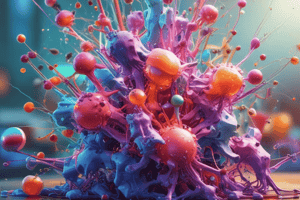Podcast
Questions and Answers
What is the branch of physical chemistry that deals with the rate of reactions?
What is the branch of physical chemistry that deals with the rate of reactions?
- Chemical Kinetics (correct)
- Chemical Equilibrium
- Thermodynamics
- Quantum Mechanics
Why are average rates sometimes not useful in chemical kinetics?
Why are average rates sometimes not useful in chemical kinetics?
- They are too complex to calculate accurately
- They do not consider the factors influencing reaction rates
- They only focus on the beginning of a reaction
- They cover a large time interval where the reaction rate changes significantly (correct)
What is an elementary reaction in chemistry?
What is an elementary reaction in chemistry?
- A reaction influenced by catalysts
- A reaction that occurs in multiple steps
- A simple reaction that happens in a single step (correct)
- A reaction that involves high temperatures
What does the term 'molecularity' refer to in chemical kinetics?
What does the term 'molecularity' refer to in chemical kinetics?
Which factor does not influence the rate of a reaction according to chemical kinetics?
Which factor does not influence the rate of a reaction according to chemical kinetics?
What aspect of a reaction does the order of reaction in chemical kinetics describe?
What aspect of a reaction does the order of reaction in chemical kinetics describe?
What is the molecularity of an elementary reaction defined as?
What is the molecularity of an elementary reaction defined as?
Which step in a reaction is usually considered the rate-determining step?
Which step in a reaction is usually considered the rate-determining step?
Can the molecularity of a complex reaction be determined by looking at the overall reaction?
Can the molecularity of a complex reaction be determined by looking at the overall reaction?
In consecutive reactions, what role does the product formed in one elementary reaction play?
In consecutive reactions, what role does the product formed in one elementary reaction play?
In parallel or side reactions, how many paths do the reacting substances typically follow?
In parallel or side reactions, how many paths do the reacting substances typically follow?
What determines the speed at which a reaction can proceed?
What determines the speed at which a reaction can proceed?
What is the term used to describe the situation when the rate of the forward reaction equals the rate of the backward reaction?
What is the term used to describe the situation when the rate of the forward reaction equals the rate of the backward reaction?
In a zero order reaction, what is the relationship between the rate and the concentration of reactants?
In a zero order reaction, what is the relationship between the rate and the concentration of reactants?
What is the term used to describe reactions where the products formed also react to give back the reactants?
What is the term used to describe reactions where the products formed also react to give back the reactants?
What is the significance of the half-life of a reaction?
What is the significance of the half-life of a reaction?
For a first order reaction, what is true about its half-life?
For a first order reaction, what is true about its half-life?
What can be said about the molecularity and order in an elementary reaction?
What can be said about the molecularity and order in an elementary reaction?
What is required for a chemical reaction to take place according to the collision theory?
What is required for a chemical reaction to take place according to the collision theory?
Where does the energy for bond breaking in a chemical reaction come from?
Where does the energy for bond breaking in a chemical reaction come from?
What is the correct orientation of colliding molecules for a successful reaction?
What is the correct orientation of colliding molecules for a successful reaction?
Which theory assumes that simply a collision between reactant molecules does not cause a reaction?
Which theory assumes that simply a collision between reactant molecules does not cause a reaction?
What does the rate of a chemical reaction depend on according to the text?
What does the rate of a chemical reaction depend on according to the text?
What is the role of activation energy in the Arrhenius equation?
What is the role of activation energy in the Arrhenius equation?
What is formed during a collision between reactant molecules?
What is formed during a collision between reactant molecules?
What happens to the fast approaching reactant molecules during a collision?
What happens to the fast approaching reactant molecules during a collision?
What is the activated complex also known as?
What is the activated complex also known as?
What happens to the B-C bond when a partial bond forms between atoms A and B?
What happens to the B-C bond when a partial bond forms between atoms A and B?
If the potential energy of the products is greater than that of the reactants, what can be said about the reaction?
If the potential energy of the products is greater than that of the reactants, what can be said about the reaction?
What is the difference in potential energy between the reactants and the activated complex called?
What is the difference in potential energy between the reactants and the activated complex called?



